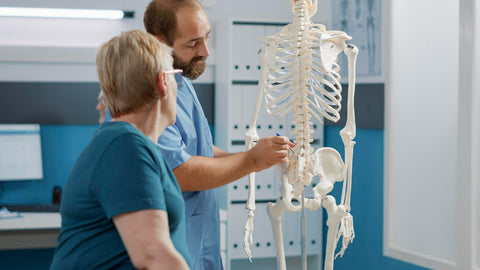Osteoporosis is a condition in which the bones become weak and brittle because of the gradual loss of bone tissue.
KEY CAUSES
- Nutritional deficiencies (especially lack of Vitamin D, K2, Silica, Boron, Zinc, and Magnesium). Vitamin D deficiency plays important role in the development of osteoporosis. It is essential in helping your body to properly absorb and store calcium in bones making them strong. Vitamin D works with the parathyroid hormone to maintain calcium levels. Additionally, it has an effect on other important vitamins and minerals that contribute to bone health, including magnesium, vitamin K and phosphorus. Vitamin K is required for the production and proper function of enzyme osteocalcin required for proper bone-forming process. Vitamin K2 has been found to be more effective in this process than Vitamin K1. There is no question that also Silica, Boron, Magnesium, and Zinc play very important role in bone formation and bone health, and like Vitamin K2 and Vitamin D, they seem to be more important for strong bones than Calcium.
- Lack of exercise and sedentary lifestyle. Due to the lack of proper exercise, astronauts lose an average of more than 1% bone mass per every month spent in space. Similarly, every person who lives a sedentary lifestyle, over time develops the same problem. Physical activity improves blood circulation in bones and increases the natural need for strong bones to prevent fractures. As a result, bone cells absorb more calcium and other nutrients to strengthen themselves. In long-term studies, researchers found that regular participation in energetic exercise, leads to a significant increase in bone mineral content.
- Hormonal imbalance (low estrogen during menopause). Low oestrogen makes various bone cells less efficient in making new bone and maintaining bone structure. However, in most cases, low oestrogen during menopause may not be the key cause of osteoporosis. Many women have been weakening their bones through sedentary lifestyle, bad diet, and other factors for decades and when during the menopause their estrogen production declines, it doesn’t cause osteoporosis because they already developed it. Lower oestrogen only makes it worse. On the other hand, women who have been on a diet and lifestyle that promote healthy bones do not develop osteoporosis during menopause even if their oestrogen levels drop.
- Diet high in animal protein (meat, dairy, etc.) is one of the key causes of weak bones and osteoporosis. African, Chinese, and South Korean women whose diet is either totally plant-based or very low in animal protein, do not develop osteoporosis during menopause. On the other hand, in America and Scandinavian countries, where the dairy consumption is the highest in the he world, the prevalence of osteoporosis and hip fractures is the highest too! Because dairy and meat products are high in animal protein, they may actually interfere with the retention of calcium stores and cause more calcium to be lost than saved. High levels of animal protein make an acid condition in the blood thus triggering loss of calcium from the bones as calcium is used to make blood more alkaline. Also zinc, which is required for healthy bones, is lost when a high animal protein diet is consumed.
- Caffeine and other methylxanthines found in coffee, colas, tea, and chocolate, block calcium absorption from food. A custom of drinking 2-4 cups of coffee a day can set the stage for developing osteoporosis. The same is true for alcohol beverages. Tobacco has been found to alter natural estrogen metabolism and accelerate bone loss.
- Diet high in sugar and other refined products. Sugar impairs body’s uptake and utilization of calcium and magnesium, thereby setting the stage for osteoporosis and an increased fracture risk. Like animal protein, sugar creates acidic blood forcing our body to reduce acidity by pulling calcium from bones thus weakening them. Sugar consumption is also associated with a decrease in the active form of vitamin D, the most important nutrient required for healthy bones and immune system. The overconsumption of sugar also impairs bone formation by causing high blood glucose levels associated with lower bone density.
SOLUTION
In order to make your bones strong and healthy you need to address the above key causes by implementing the following principles:
- Use the following good nutritional supplements that are most vital for healthy bones: Vitamin D3 (2000 IU to 5000 IU daily), Vitamin K2 (50-200mcg daily), Boron (3-6mg daily), Magnesium (such as citrate or bisglycinate: 150-200mg twice daily), Zinc (10-20mg daily), and Silica (bamboo extract). Osteozin (HealthAid) contains most of these vitamins and minerals and right (moderate) amount of Calcium (3 different forms for better absorption). For even better result, take Osteozin with additional Vitamin D3 (2000 IU to 5000 IU daily) and Magnesium Citrate powder (1/2 teaspoon twice daily).
- Take Super Greens (HealthAid) to make your blood less acidic and more alkaline to help reduce calcium loss from your bones.
- Exercise vigorously every day. Sixty-minute fast walk outside twice daily is the best way to go.
- Go on a healthy at least 70-80% plant-based unrefined diet high in fresh raw and steamed vegetables. Replace animal protein with plant protein (pulses, seeds, nuts, Tofu, organic soya products, plant milks, etc.).
- Replace refined sugar and high fructose /glucose syrup with good sweeteners such as erythritol, xylitol, raw organic honey, dried and fresh fruits (avoid fruit juices), stevia, coconut sugar, etc.
- Avoid caffeine and other stimulants. Drink herbal teas and/or barleycup instead of coffee and black tea.
RELATED ARTICLES
Are Menopausal Symptoms Normal and How to Prevent and Cope with Them?
Any information or product suggested on this website is not intended to diagnose, treat, cure or prevent any medical condition. Never disregard medical advice or delay in seeking it because of something you have read on this website. Consult your primary healthcare physician before using any supplements or making any changes to your regime.





